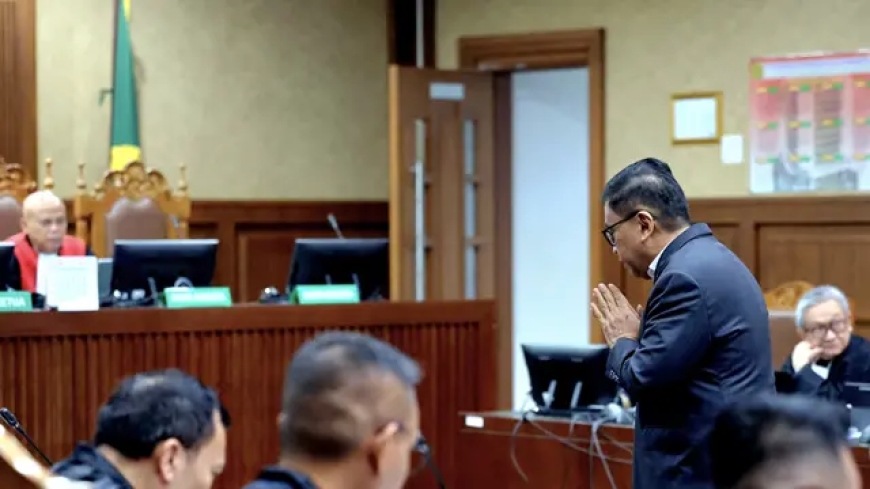Hasto Kristiyanto Faces 7-Year Sentence in High-Profile Corruption and Obstruction Case
Indonesian politician Hasto Kristiyanto faces 7-year prison sentence in the Harun Masiku bribery case. His legal team denounces the charges as politically motivated and lacking evidence.

Jakarta, En indonesiaupdates.com – Indonesian Democratic Party of Struggle (PDIP) Secretary-General Hasto Kristiyanto is facing a 7-year prison sentence and a fine of IDR 600 million (approx. USD 36,000) after the Corruption Eradication Commission (KPK) prosecutor charged him in connection with the Harun Masiku bribery case and obstruction of justice.
The case, unfolding at the Central Jakarta Corruption Court, is one of the most politically charged trials in recent years, with accusations of legal engineering, political interference, and an attempt to weaken opposition voices ahead of Indonesia’s 2029 general election cycle.
KPK Prosecutor Demands 7 Years, Fine, and Additional 6 Months If Unpaid
The prosecutor from the KPK formally requested the court to impose a 7-year sentence, along with a subsidiary sentence of 6 months if the financial penalty is not paid. The charges include:
-
Involvement in the bribery scheme to appoint Harun Masiku as a replacement member of the DPR RI (People’s Representative Council).
-
Alleged efforts to obstruct the investigation into the case during the ongoing search for Harun, who has been on the run since 2020.
Despite the charges, Hasto stood defiantly, raising his fist and shouting "Freedom, freedom, freedom!" outside the courtroom—emphasizing that his political stance and commitment to democratic integrity had led to his criminalization.
Legal Team: “Baseless Charges, Full of Assumptions and Political Orders”
Ronny Talapessy, Hasto’s attorney, labeled the prosecutor's indictment as unsubstantiated, arguing it was constructed purely from assumptions, not trial-based evidence.
“This is legal fiction. None of the key witnesses testified to Hasto’s involvement in either bribery or obstruction,” Ronny said.
He further emphasized that the prosecution merely repeated narratives from the investigation phase, ignoring courtroom revelations. The key accusations about bribery and obstruction were not corroborated by witness testimony or physical evidence.
Key Witnesses and Experts Contradict Prosecutors’ Narrative
Several expert witnesses—including a former Constitutional Court judge—testified that the obstruction article could not be applied once a case has entered final legal stages.
Additionally, forensic experts presented by the KPK themselves admitted that no digital evidence—such as the alleged destruction of phones—could be proven.
Hasto’s legal team also criticized inconsistencies in Call Detail Records (CDRs) used by the prosecution, which showed implausible travel times for Harun Masiku within Jakarta—calling it a violation of common sense.
Political Criminalization? Defense Team Points to Pressure and Party Dynamics
Renowned lawyer Maqdir Ismail claimed that the charges were part of a broader political effort to weaken PDIP leadership and coerce party decisions.
“We were told—off the record—that if Hasto stepped down from his role and did not expel Jokowi from PDIP, there would be no prosecution,” Maqdir revealed.
This revelation strengthens suspicions that the case is not just a legal matter, but deeply entwined with internal power struggles within PDIP and national politics.
Defense Plea Ready, Hasto Urges Supporters to Trust in Justice
Hasto Kristiyanto stated his defense plea was 80% complete and would be presented at the next court hearing scheduled for July 10, 2025. He urged all PDIP cadres and supporters to remain calm and believe in the power of truth and justice.
“From the beginning, I predicted this. But I will face it with my head held high. The truth will prevail,” Hasto said.
Trial Highlights Fragile Line Between Justice and Politics in Indonesia
The trial of Hasto Kristiyanto not only tests the credibility of the KPK but also reveals the tenuous balance between law and politics in Indonesia’s evolving democracy.
Whether this case leads to a conviction or acquittal, it has already sparked national conversations about the use of law as a political weapon, judicial independence, and the future of opposition figures in Indonesia.
What's Your Reaction?
 Like
0
Like
0
 Dislike
0
Dislike
0
 Love
0
Love
0
 Funny
0
Funny
0
 Angry
0
Angry
0
 Sad
0
Sad
0
 Wow
0
Wow
0










